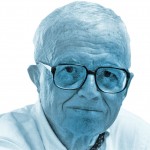
When Richard P. Feynman, one of the giants of 20th-century physics, was awarded the Nobel Prize in 1965, he received hundreds of congratulatory letters from friends and admirers, including one from a former student named Koichi Mano. Acknowledging the letter, Feynman asked the young scientist what he working on. Koichi sent a doleful reply, regretting that he wasn’t working on fundamental problems of science, but only on “a humble and down-to-earth type of problem.”
“Your letter made me unhappy,” Feynman wrote back, “for you seem to be truly sad. No problem is too small or too trivial if we can really do something about it. It seemed that the influence of your teacher has been to give you a false idea of what are worthwhile problems.” In his own career, Feynman pointed out, he had “worked on innumerable problems that you would call humble, but which I enjoyed and felt very good about because I sometimes could partially succeed.” He went on to describe a dozen of those experiments, some of which failed, including one on the theory of turbulence that he “spent several years on without success.”
I came upon this exchange in a book of letters to and from Feynman, published in 2005, called Perfectly Reasonable Deviations from the Beaten Track. Edited by his daughter, Michelle Feynman, the letters had languished for many years in 12 filing cabinets at the California Institute of Technology after her father’s death in 1988. The ones she selected for this spacious volume are highly personal, most of them replying to “ordinary” people who wrote to Feynman with scientific questions. They are the letters of a born teacher.
Concluding his letter to Koichi Mano, Feynman wrote: “You say you are a nameless man. You are not to your wife and to your child. You will not long remain so to your immediate colleagues if you can answer their simple questions when they come into your office. You are not nameless to me. Do not remain nameless to yourself–it is too sad a way to be. Know your place in the world and evaluate yourself fairly, not in terms of the naïve ideals of your own youth, nor in terms of what you erroneously imagine our teacher’s ideals are. Best of luck and happiness.”
I’m a scientific rube, but I happened to become a Feynman watcher many years ago. I was attracted to his strong sense of enjoyment and to his engaging–and engaged–presence as a public man of science. Now, in these letters, I saw that he was also one of the great permission givers.
That’s a type I’m always on the lookout for; permission is a scarce commodity in this land of multiple freedoms. I’m also in the permission business. As a teacher and as a mentor I give people permission to be who they want to be, and sometimes I think: How did I get stuck with this job? Isn’t that what our schools are supposed to be doing? The answer, I’ve found, is that most Americans look back on their education as a permission-denying experience–a long trail of don’ts and can’ts and shouldn’ts.
I’ve made that point in talks to college presidents and school administrators, and not one has ever argued back. All of them remember the prohibitions that were put in the path of their own advancement: the niggling caveats of dissertation committees, the envious gibes of peer reviewers, the dire threats that they will perish if they don’t continue to publish.
Consider the American process of college admissions–a yearlong minuet of repudiation. WE DARE YOU TO GET INTO OUR COLLEGE! YOUR GRADES ARE EXCELLENT BUT NOT EXCELLENT ENOUGH. FURTHERMORE, YOU DON’T PLAY THE OBOE AND YOU HAVEN’T SPENT ANY TIME DIGGING WELLS IN A VILLAGE IN BOTSWANA. Consider the countless hours we require our children to attend classes and tutoring sessions whose sole purpose is to teach them how to pass college entrance tests–a body of knowledge wholly useless to their growth.
Women in particular are starved for permission, especially women writers. In the adult memoir class that I’ve long taught at the New School, in New York, teasing memories out of bright and accomplished women eager to make sense of their lives through an act of writing, I’m struck by how apologetic they are, how unconfident of the worthiness of the story they want to tell. They want to be given permission to tell it.
Women writers! You must give yourself permission, by a daily act of will, to believe in your remembered truth. Do not remain nameless to yourself. Only you can turn on the switch; nobody is going to do it for you. Nobody gave George Gershwin permission to write “Rhapsody in Blue” at the age of 25, when he had only written 32-bar popular songs. Nobody gave Frank Lloyd Wright permission to design a round museum.
[See “Wise Man,” by Freeman Dyson, a review of Feynman’s Reasonable Deviations from the Beaten Track. New York Review of Books, October 20, 2005.]


